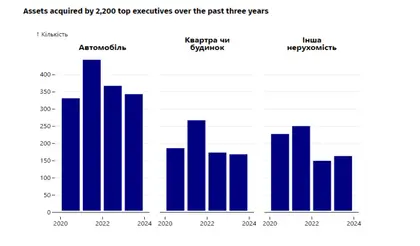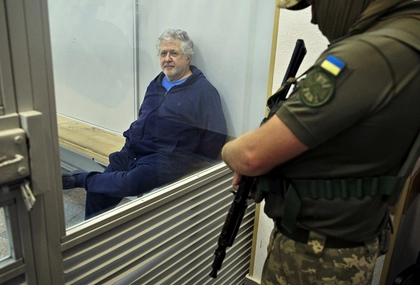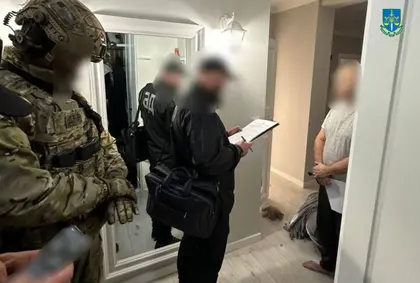A week of investigations, arrests and levelling of charges resuted in a spate of personnel reshuffling.
Government investigators made high-profile searches of current and former officials, heads of the tax inspection of the city of Kyiv, oligarch Ihor Kolomoisky, and parliamentarian Vadym Stolar.
JOIN US ON TELEGRAM
Follow our coverage of the war on the @Kyivpost_official.
Suspicions were also raised against former Deputy Minister of Defense, Vyacheslav Shapoval, and the head of the procurement department, Bohdan Khmelnytsky; ex-president of Motor Sich, Vyacheslav Bohuslaiev; the top management of Ukrtatnafta; six participants in the property sale scheme of the National Cinematheque of Ukraine; company manager Kostyantyn Zhevago; and ex-Minister of Energy and the Coal Industry, Ihor Nasalyk.
President Volodymyr Zelenskyy had no choice but to start a real fight against corruption.
You cannot win a war if you have corruption. This was proved by the Russian army, which tried to occupy Kyiv in three days in spring of last year.
Corruption demoralizes soldiers at the front and citizens in the rear.
When Ukrainian marauders profit from supplies to the armed forces, it creates problems in communication with Western partners, who want to know where their critical aid for our country is going.
Finally, corruption imperils the political future of President Volodymyr Zelensky himself.
Therefore, the experts of the Information Defense Project are convinced that the head of the country is absolutely sincere, having become the leader of the anti-corruption fight. His personal goal is not merely a symbolic gesture, it is his very real aim to eradicate corruption.

Top Officials Wealth May Have Gone Up During War – Economic Pravda Report
But Zelensky wouldn’t be Zelensky if this operation didn’t look like a well-staged anti-corruption show at Bankova St. where his heaquarters are located.
Such investigations and suspicions in one fell swoop required clear coordination from the Office of the President of Ukraine (OPU).
Moreover, the search of former Interior Minister Arsen Avakov regarding the helicopter crash that killed the leadership of the Ministry of Internal Affairs in Brovary testified that the authors of the anti-corruption operation sometimes sacrifice their credibility in order to reach a larger number of influential suspects.
The head of the OPU, Andriy Yermak, and his deputy, Oleh Tatarov, have seriously strengthened their political positions.
Another influential player has joined the fight against corruption – the United States, or rather, its controlling bodies.
It is clear that when tens of billions of dollars of Western aid flow into a country, the intelligence agencies of those countries will monitor the aid closely, notwithstanding the difficulties associated with wartime.
To Ukraine’s credit, after the latest corruption scandals, the U.S. has stated that they have revealed no facts about major criminal activities in the distribution of weapons going to Ukraine.
However, this did not prevent the offices of the inspectors general of the Pentagon, the Department of State and the United States Agency for International Development from adopting a Joint Strategic Plan for oversight of the assistance provided to Ukraine for the 2023 financial year. For its implementation, a joint inspection group of representatives of these departments was created and new inspection protocols were approved.
The path to the EU begins with the first seven steps
On Feb. 3, 2023, Ukraine hosted the President of the European Council, Charles Michel, and the President of the European Commission, Ursula von der Leyen. A joint meeting of the European Commission and the Government of Ukraine was held in Kyiv, where the results of the seven steps necessary for the start of negotiations on EU membership were summarized.
Ukraine needs to: improve the procedure for selecting judges to the Constitutional Court; carry out judicial reform; continue the development of anti-corruption bodies; adopt a law on national minorities; adjust the law on media; and improve the legislation in combating money laundering as well as the anti-oligarch law.
In general, Europeans have assessed Ukraine’s progress in fulfilling these seven tasks positively. Ukraine’s achievements during the war can be called unprecedented – other candidates could not achieve comparable progress even in peacetime.
The assessments of Ukrainian experts are more restrained. Problems have been observed in four areas, and not all of them are related to Ukrainian performers.
The biggest concern is the lack of progress, and even regression, in improving the procedure for selecting judges of the Constitutional Court. Recently adopted amendments to the relevant law preserve the possibility for the authorities to ignore the opinion of the Advisory Group of Experts regarding the rejection of unscrupulous candidates. At the same time, under pressure from the EU, the Government announced amendments to the law on the Constitutional Court.
The implementation of anti-corruption reform today is primarily connected with the finalization of the election procedure for the position of the director of the National Anti-Corruption Bureau (NABU). So far, the selection procedure has not cause any particular comments. However, the final assessment will depend on the appointment of a truly independent director of the NABU.
The other two problems are related to external factors.
The law on national minorities was adopted in compliance with EU requirements. However, Romania has said that it proposes to hold intergovernmental consultations on the content of its individual provisions.
Undoubtedly, diplomatic battles will continue with Hungary, which demands changes to the educational law regarding the study of languages of national minorities in elementary schools.
In the case of anti-oligarch legislation, the ball is completely in the Europeans’ court. Thus far, there has been no conclusion of the Venice Commission regarding the anti-oligarch law; however, it is important to take it into account and make appropriate changes to the relevant law.
So what do we have in the end?
First, Ukraine is approaching the finishing line regarding the beginning of negotiations on EU membership. About this should be made in October 2023.
On the eve of the Kyiv summit, the European Parliament adopted a resolution in which it recommended the EU to conduct work from the beginning of negotiations on Ukraine’s accession. At the same time, the MEPs called on Ukraine “to carry out significant reforms as soon as possible so that the country meets the criteria for EU membership.”
Ukraine’s future membership in the European community was also clearly stated in the decision of the Kyiv EU-Ukraine summit.
Second, the integration of Ukraine into the European economic space continues.
During the summit, an agreement on Ukraine’s participation in the EU “Single Market” was signed. European and Ukrainian communication operators also signed a memorandum extending for half a year the agreements on affordable roaming for Ukrainians.
And finally, the EU no longer raises objections to Ukraine’s accession. Now the questions are only: On what terms and how soon?
Pessimists cautiously talk about five to seven years being necessary for the completion of EU membership.
Optimists, together with realists, are convinced that Ukraine’s accession to the EU will certainly take place immediately after our country’s victory in the Russo-Ukrainian war.
You can also highlight the text and press Ctrl + Enter






